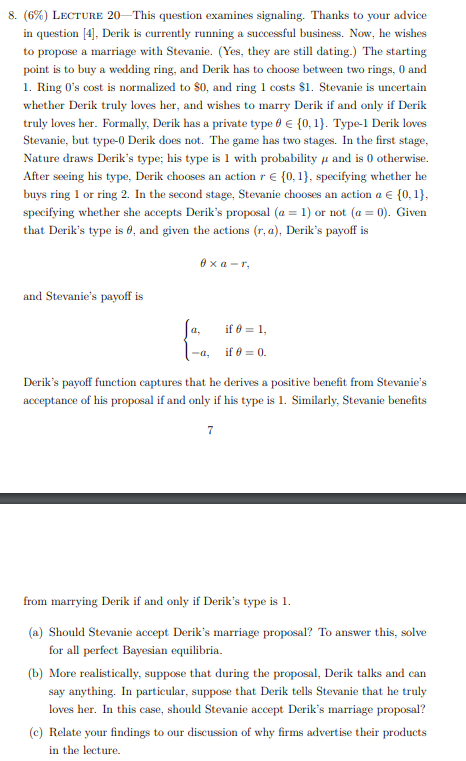8. (6%) Lecture 20This question examines signaling. Thanks to your advice in question [4], Derik is currently running a successful business. Now, he wishes to propose a marriage with Stevanie. (Yes, they are still dating.) The starting point is to buy a wedding ring, and Derik has to choose between two rings, 0 and 1. Ring 0s cost is normalized to $0, and ring 1 costs $1. Stevanie is uncertain whether Derik truly loves her, and wishes to marry Derik if and only if Derik truly loves her. Formally, Derik has a private type {0, 1}. Type-1 Derik loves Stevanie, but type-0 Derik does not. The game has two stages. In the first stage, Nature draws Deriks type; his type is 1 with probability and is 0 otherwise. After seeing his type, Derik chooses an action r {0, 1}, specifying whether he buys ring 1 or ring 2. In the second stage, Stevanie chooses an action a {0, 1}, specifying whether she accepts Deriks proposal (a = 1) or not (a = 0). Given that Deriks type is , and given the actions (r, a), Deriks payoff is a r, and Stevanies payoff is a, if = 1, a, if = 0. Deriks payoff function captures that he derives a positive benefit from Stevanies acceptance of his proposal if and only if his type is 1. Similarly, Stevanie benefits 7 from marrying Derik if and only if Deriks type is 1. (a) Should Stevanie accept Deriks marriage proposal? To answer this, solve for all perfect Bayesian equilibria. (b) More realistically, suppose that during the proposal, Derik talks and can say anything. In particular, suppose that Derik tells Stevanie that he truly loves her. In this case, should Stevanie accept Deriks marriage proposal? (c) Relate your findings to our discussion of why firms advertise their products in the lecture.
8. (6%) LECTURE 20-This question examines signaling. Thanks to your advice in question [4], Derik is currently running a successful business. Now, he wishes to propose a marriage with Stevanie. (Yes, they are still dating.) The starting point is to buy a wedding ring, and Derik has to choose between two rings, and 1. Ring O's cost is normalized to $0, and ring 1 costs $1. Stevanie is uncertain whether Derik truly loves her, and wishes to marry Derik if and only if Derik truly loves her. Formally, Derik has a private type 8 {0,1}. Type-1 Derik loves Stevanie, but type-0 Derik does not. The game has two stages. In the first stage, Nature draws Derik's type; his type is 1 with probability and is otherwise. After seeing his type, Derik chooses an action r {0,1}, specifying whether he buys ring 1 or ring 2. In the second stage, Stevanie chooses an action a {0,1}, specifying whether she accepts Derik's proposal (a = 1) or not (a = 0). Given that Derik's type is 8, and given the actions (r.a), Derik's payoff is exer, and Stevanie's payoff is fa, a. if = 1, -a, if = 0. Derik's payoff function captures that he derives a positive benefit from Stevanie's acceptance of his proposal if and only if his type is 1. Similarly, Stevanie benefits 7 from marrying Derik if and only if Derik's type is 1. (a) Should Stevanie accept Derik's marriage proposal? To answer this, solve for all perfect Bayesian equilibria. (b) More realistically, suppose that during the proposal, Derik talks and can say anything. In particular, suppose that Derik tells Stevanie that he truly loves her. In this case, should Stevanie accept Derik's marriage proposal? (c) Relate your findings to our discussion of why firms advertise their products in the lecture. 8. (6%) LECTURE 20-This question examines signaling. Thanks to your advice in question [4], Derik is currently running a successful business. Now, he wishes to propose a marriage with Stevanie. (Yes, they are still dating.) The starting point is to buy a wedding ring, and Derik has to choose between two rings, and 1. Ring O's cost is normalized to $0, and ring 1 costs $1. Stevanie is uncertain whether Derik truly loves her, and wishes to marry Derik if and only if Derik truly loves her. Formally, Derik has a private type 8 {0,1}. Type-1 Derik loves Stevanie, but type-0 Derik does not. The game has two stages. In the first stage, Nature draws Derik's type; his type is 1 with probability and is otherwise. After seeing his type, Derik chooses an action r {0,1}, specifying whether he buys ring 1 or ring 2. In the second stage, Stevanie chooses an action a {0,1}, specifying whether she accepts Derik's proposal (a = 1) or not (a = 0). Given that Derik's type is 8, and given the actions (r.a), Derik's payoff is exer, and Stevanie's payoff is fa, a. if = 1, -a, if = 0. Derik's payoff function captures that he derives a positive benefit from Stevanie's acceptance of his proposal if and only if his type is 1. Similarly, Stevanie benefits 7 from marrying Derik if and only if Derik's type is 1. (a) Should Stevanie accept Derik's marriage proposal? To answer this, solve for all perfect Bayesian equilibria. (b) More realistically, suppose that during the proposal, Derik talks and can say anything. In particular, suppose that Derik tells Stevanie that he truly loves her. In this case, should Stevanie accept Derik's marriage proposal? (c) Relate your findings to our discussion of why firms advertise their products in the lecture







